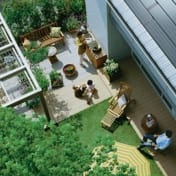Message from Management
Providing happiness as a global partner committed to creating value for the next 30 years

Embarking on a new challenge: Making home the happiest place in the world
Our 4th Mid-term Management Plan, committed to a policy of underpinning our housing-related businesses beyond 2020, entered its final year in 2019. Notably, we succeeded in achieving record highs in both sales and operating income as a result. In addition to implementing a strategy of high added value in our domestic business that included promotion of the Net Zero Energy House (ZEH) and regional marketing strategies for rental housing, we posted steady growth in our international business that contributed significantly to our business performance. Moreover, this year represented a period of preparation for the mission and the new challenges we have mapped out for the next 30 years.
Our company will mark its 60th anniversary in the year 2020, during a time when the world is suffering the impact of the novel coronavirus. For its part, the Sekisui House Group will continue its business operations while maintaining close cooperation with government departments and other relevant organizations. At the same time, we will give top priority to the safety of our customers, employees, and everyone involved on our construction sites and elsewhere as we do our utmost to instigate countermeasures against the spread of the virus.
In March 2020, we announced our 5th Mid-term Management Plan as well as our new 30-year Vision. Our group, which identifies our upcoming phase as “NEXT SEKISUI HOUSE,” has developed a growth strategy that focuses on our housing segment under our 5th Mid-term Management Plan. Our goal is to further strengthen our core business while developing new businesses. We are pursuing our business objectives with a policy of “meeting the challenge.”
The housing industry is closely intertwined with many of the issues confronting society today. Sekisui House has been meeting the challenge of devising solutions to social issues as we have dealt with every one of our customers over our 60 years of history. Looking back on our history with the perspective of addressing our social mission, our first phase was to establish the basic housing performance that provides residents with safety and security. In other words, it has been 30 years since we first identified the function of housing as a form of shelter that protects our lives and assets. We also responded to the national policy of providing a certain target level of housing. Our second phase was the 30-year period during which we pursued comfort and environmental performance and sought to create humancentered housing and living environments. In 1990, we opened the Comprehensive Housing R&D Institute to conduct research and development in terms of both tangible and intangible elements. We have helped to create industryleading living environments noted for their comfort through a focus on universal design, the eco-friendly Airkis air quality specification, the Gohon no ki (“five trees”) project, and environmental technologies such as high-performance thermal insulation that inspired our “Green First” strategy. The third phase is represented by the 30-year period leading up to 2050; through this initiative, the Sekisui House Group has launched its new 30-year Vision. With the global vision of making home the happiest place in the world, we aim to become a global company that integrates tangible and intangible products and services with a focus on housing.
Combining tangible and intangible products and services that contribute to contentment
The Platform House Concept is an important initiative intended to achieve our vision. We introduced this concept a year ago at the Consumer Electronics Show (CES) 2019, one of the electronics industry's largest trade shows, held in Las Vegas, U.S.A. Because we feel that happiness is an intangible asset over the long term, we factor it into the health, connection, and learning aspects we incorporate into our houses to assist in engendering happiness. Our first effort in this project was the construction of the world's first HED-Net (In-Home Early Detection Network), a network that responds quickly to incidents of acute illness at home. In fact, responding to such instances has become an urgent issue these days; HED-Net responds by detecting an abnormal physical condition through non-contact sensors that can report an emergency without causing stress to the resident. This safety confirmation and early response system can consistently issue reports and provide guidance to emergency services. This innovation was also presented at CES 2020 held in January. One such acute illness is stroke, which strikes about 290,000 people annually in Japan. The data shows that 79% of strokes occur in the home. If we also consider the prevalence of heart disease, drowning, and falls, a total of about 70,000 people die in their homes in Japan each year. The introduction and widespread adoption of HED-Net would enable early detection and emergency response to the onset of an acute illness or accident at home. In addition, trial calculations indicate that, when HED-Net is combined with the Platform House Concept, the potential for reducing social costs such as medical costs, nursing care costs, and lost labor costs is about 20%, or 1.9 trillion yen. Expectations for this innovation are thus quite high. In addition, we believe this could reduce the number of people who require nursing care or who take medical leave. Clearly, this project offers new value for Japan, a developed country with a mature and aging population. By fusing tangible and intangible products and services, we aim to become a partner in the generation of contentment in an era of centenarians while also maintaining close contact with homeowners.
Sekisui House Technology: Becoming the world's de facto standard
If we take a global perspective, we can see that issues such as climate change and the changing economic environment are having a profound impact. As a provider of high-quality housing in Japan, we can make a significant contribution to issues such as housing shortages and supply-demand gaps. Moreover, we offer environmental technologies and address the basic performance of houses capable of withstanding natural disasters.
Today, we aim to achieve sustainable growth through our international business by promoting the three businesses that we are currently operating in Japan: our development business, our built-to-order housing business, and our supplied housing business. In order to advance our business overall, we believe it is essential that we address the salient social issues in the various countries and regions in which we operate. For example, in the United States, the seasonal climate varies considerably by region, and natural disasters such as earthquakes and hurricanes present a variety of housing challenges that must be addressed. We believe that the technologies and expertise we have developed at Sekisui House can be useful in solving these issues. In the U.S.A., the chowa concept home uses Sekisui House's SHAWOOD wooden housing system, which was presented at the opening of CES 2020. When I introduced our company, the first thing that surprised visitors was the high level of seismic performance and the technical advances demonstrated by our houses. In fact, during the Hanshin-Awaji Earthquake and the Great East Japan Earthquake, not a single Sekisui House collapsed or suffered severe damage. In addition, in light of the Message from Management Yoshihiro Nakai President & Representative Director frequent power outages that occur in some regions, the ZEH specification attracted great interest. As a consequence, I feel that good potential exists for our international business there. Of course, we will also promote our SDG initiatives from this perspective. As a global company specializing in housing, I am confident Sekisui House technology will become the de facto standard in the world. By transplanting the environmental, disaster preparedness, and construction technologies developed by Sekisui House to other countries, we can contribute to the happiness of people around the world.
Becoming a leading company in ESG management
Through its focus on sustainable growth, the Sekisui House Group aims to become a leading company in ESG management. For example, under our environmental initiatives, we have achieved a ZEH ratio of 87% for newly built houses. By utilizing the technical expertise we have gained in constructing a cumulative total of 51,793 such buildings, we are promoting rental housing, condominiums, and nonresidential buildings built to ZEH standards. Furthermore, we have expanded into the field of remodeling and renovation, as reflected in our Idokoro Dan-netsu renovation service that suggests ways to raise the comfort level of existing detached houses to the ZEH level. Contributing to the emergence of a low-carbon lifestyle and a comfortable living environment for our customers is an important aspect of managing for a decarbonization business. Moreover, Sekisui House Owner Denki, our business that purchases surplus electricity from solar power generators in order to power business operations within the group, received more applications than expected. If we continue with the purchase of so-called post-FIT electricity at this pace, we may be ahead of schedule in reaching our RE100 objective: obtaining 100% of the electricity required for business operations from renewable sources.
In order to realize our global vision of making home the happiest place in the world, I believe it is necessary to make Sekisui House the happiest company in the world. In order to become a “kids first company” that supports the healthy growth of the children who will lead the next generation, one of our initiatives is Ikumen Leave, a childcare leave system for male employees extending over a period of at least one month. Within its first year of operation, this program achieved 100% uptake. In addition to giving male employees the opportunity to make new discoveries through greater participation in childcare and housework, the program inspired comments such as “my work was able to be shared, and I improved my awareness of time management” and, “I improved communication in the workplace.” We expect this program to lead to further reform of our work style.
Recently, employee diversity has been promoted as a management strategy, and one of our personnel policies, Promotion of the Active Participation of Women, has brought solid results. The number of female managers and women in leadership roles is increasing. We plan to continue training while focusing on the promotion of women to managerial positions as we actively recruit women to sales and technical positions. We will further promote health management by introducing IT and other advanced technologies for our health initiatives targeting all employees. At Sekisui House Group, our corporate philosophy is focused on the concept of “love of humanity.” Guided by this corporate philosophy, we will all remain engaged in promoting innovation and communication. We have already launched an innovation competition internally that has given rise to many new ideas. To be clear, innovation is the challenge and mission of the Sekisui House Group. Driven by a commitment to active communication, we have all adopted a common goal and have pledged to continue creating and providing value to our customers and society at large for the next 30 years.
Sustainability Report 2020 TOP
Contributing to Health, Longevity and Wealth
Pursuing Customer Satisfaction through Our Value Chain TOP
Action policies ② Meticulous supply chain management for material procurement
Action policies ③ Enhancing production and distribution quality and improving operational efficiency
Action policies ④ Strengthening our workmanship and maximizing our construction capabilities
Basic concept & Action policies | Promoting Diversity
Basic concept & Action policies | Workstyle Reforms
Basic concept & Action policies | Human Resource Development
Independent Third-Party Assurance Report



